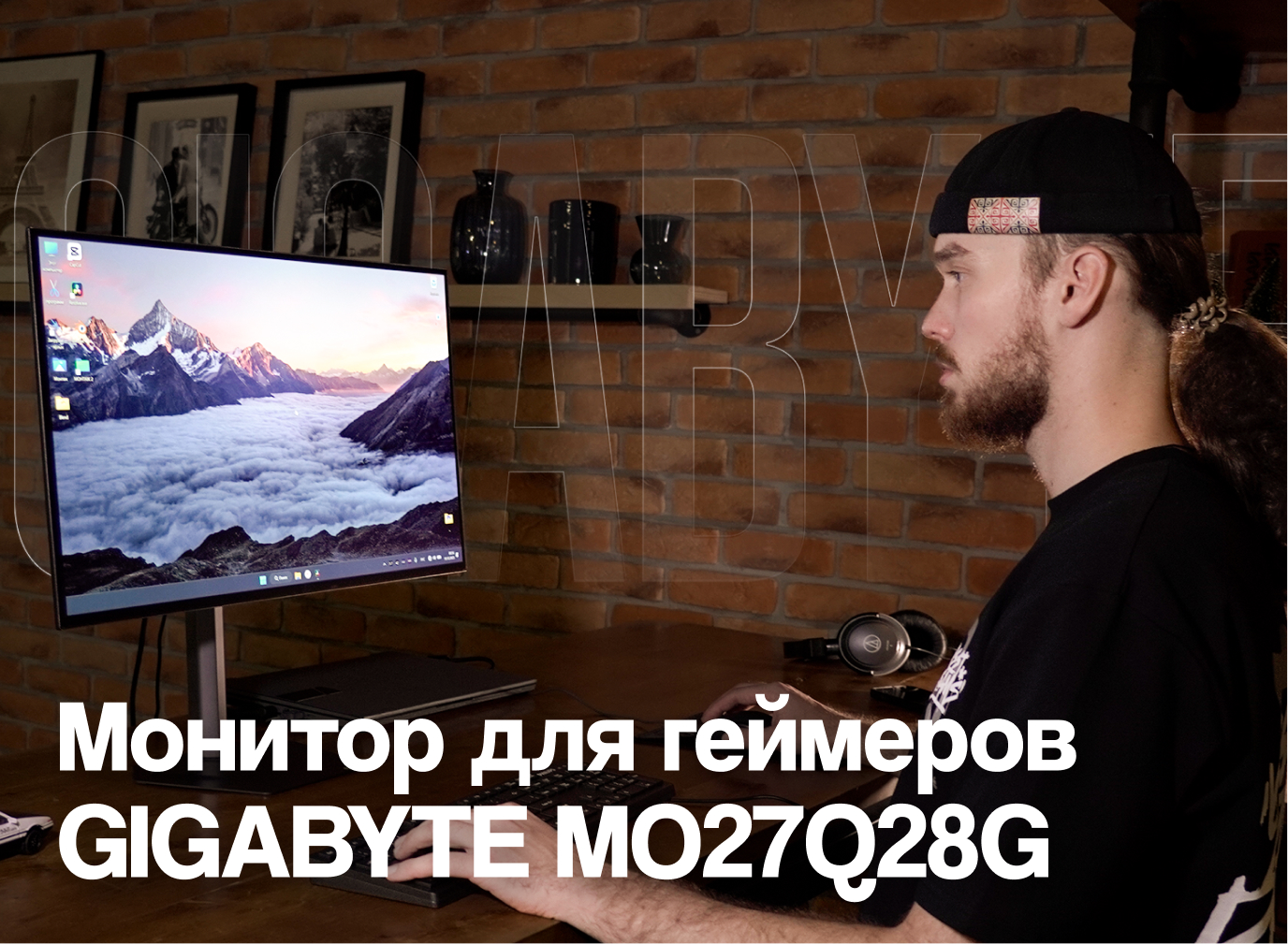Freight transport in Kazakhstan is already challenging, but add cargo theft into the mix, and things get even tougher. Roughly 15% of trucks on the road fall prey to fraud, costing companies millions. The core issues stem from outdated, non-digitized logistics processes and a lack of transparency. Biny.co is tackling these challenges head-on, offering businesses a guarantee of quality and providing drivers a way to bypass shady middlemen. Founder Aset Khasenov shared with ER10 Media how Biny.co is changing the logistics landscape in Kazakhstan and breathing new life into the historic Silk Road.
Follow Kazakhstan’s Startup Movement in the "100 Startup Stories of Kazakhstan", a collaborative project by ER10 Media and Astana Hub. This initiative highlights the most innovative Kazakh startups, showcasing projects that stand out for their creativity and impact. Among the heroes are Astana Hub residents, as well as creators of other innovative technological products and services. The content is available in Kazakh, Russian and English.
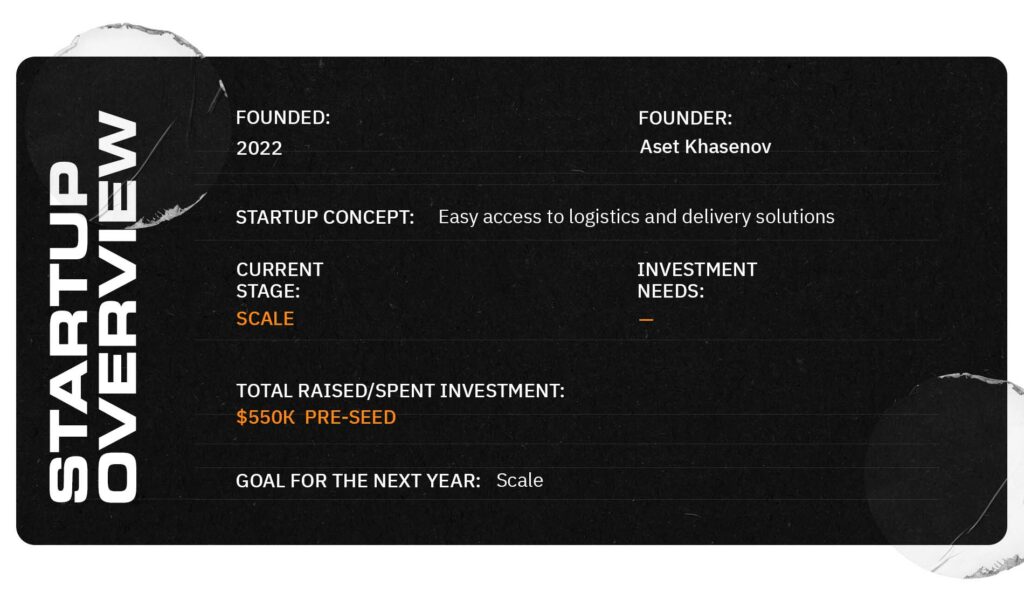
Tapping into a $2 Billion Untapped Market
— Did you start with a corporate job, or did you have a different business before Biny.co?
— I began my career as a lawyer at "Kazatomprom," working for one of its investment-focused subsidiaries. My background is in law, with degrees from Kazakhstan and Germany in international law. After a year and a half at Kazatomprom, where I worked my way up to Director of Legal, I pivoted into freight and courier services. My first company was LOTS, and alongside that, we ran a few other ventures like a call center and a small marketing agency. But it was my passion for delivery services that led to the creation of Biny.co.
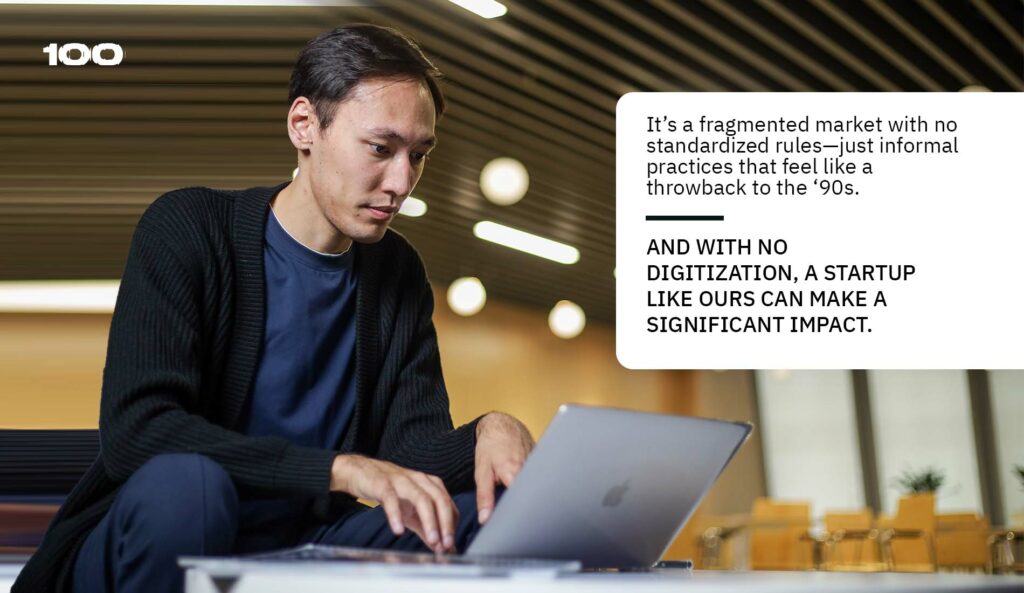
— Why choose freight transport?
— It’s a fragmented market with no standardized rules—just informal practices that feel like a throwback to the ‘90s. And with no digitization, a startup like ours can make a significant impact. We estimate the market in Kazakhstan alone to be worth $2 billion. Plus, logistics represent about 30% of any economy, and that’s huge for me. Every morning when you drink your coffee, it’s either us or our competitors who delivered it. Even the beans have a delivery cost, and the cup traveled from somewhere, too. The market is practically limitless, and so are the opportunities for growth.
— What obstacles did you face early on?
— When we launched, middlemen boycotted us, calling us scammers and thieves. They didn’t want drivers using our Biny.co app to see how they were being shortchanged. Once drivers realize the true cost of an order, they never go back to intermediaries. We saw this as a sign that we were doing something right, even as we pushed these middlemen out of the market.
There were also attempts to steal our cargo, but thankfully, we developed a solution. Drivers go through FaceID validation, and we perform detailed background checks. We’re plugged into government databases and can even see if a driver has taken out loans, where they are, and what they’re doing. We’ve taken a deep dive into driver verification to ensure our clients receive the highest level of service. Each shipment represents both current and future revenue for a business, so it’s on us to provide top-tier service.
Everything Under Control
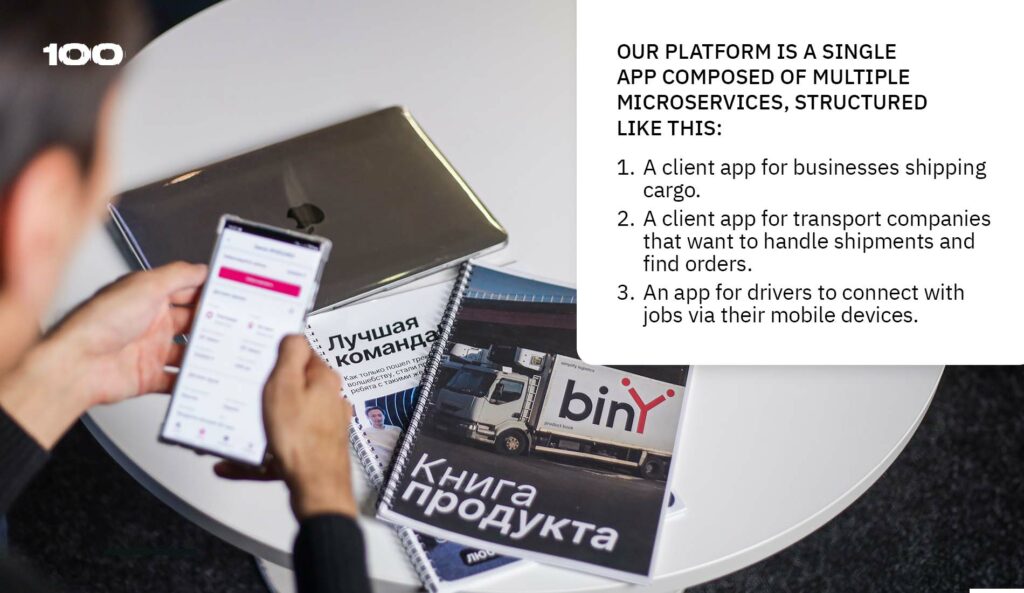
— Can you break down how your system works?
— Our platform is a single app composed of multiple microservices, structured like this:
- A client app for businesses shipping cargo.
- A client app for transport companies that want to handle shipments and find orders.
- An app for drivers to connect with jobs via their mobile devices.
Internally, we call this our communication system. Drivers can see pickup locations, warehouse details, cargo weight, and pricing. On the client side, they know in advance who the driver is and how much the delivery will cost. Everything is automated—orders are created online, and all necessary documents are issued digitally.
Once the driver arrives at the destination, they can only complete the order by pressing the “finish order” button, which is activated once the cargo is delivered and the client confirms receipt. After that, the driver is paid.
We’ve created a transparent process that drivers trust for its clarity, and clients appreciate for its reliability. We’ve even automated the insurance process—policies are automatically sent to insurance companies when a truck is loaded. This gives clients peace of mind.
— Who are your typical clients?
— We serve three main groups:
- B2B enterprise companies.
- SMEs (Small and Medium-sized Enterprises).
- The driver segment.

— What’s the team behind Biny.co like?
— We have 24 team members, each focusing on specific areas of the business:
- The development team handles all technology and product creation, led by me.
- The operations team, managed by our operations lead, includes moderators who onboard drivers and ensure verification, as well as order managers overseeing shipments.
- The commercial team is responsible for attracting and integrating clients.
- The finance team manages the financial aspects.
— How did you transition from law to overseeing technical processes at a startup?
— I picked up development by learning alongside the tech team. After mastering law, especially in Kazakhstan, I got bored and dove into product development. Since 2021, we’ve been building this product together. We learned and even designed some of our algorithms during the pandemic. Turns out, we made good use of quarantine time.
— Which markets are you currently in, and where do you plan to expand?
— Alongside Kazakhstan, we’re already operating in Uzbekistan, partially in Russia, and we’re looking to expand into Kyrgyzstan. In the future, we plan to enter China, Southeast Asia, and the MENA region by 2025.
We’ve recently restructured our company to make it easier to open branches and offices, as our current legal structure isn’t flexible enough for regional expansion. Each region will be managed by a separate legal entity. We’re dealing with drivers from Uzbekistan, Russia, and Belarus, which brings significant tax risks. We’re constantly in discussions about platform-based employment legislation and hope it will be implemented soon.
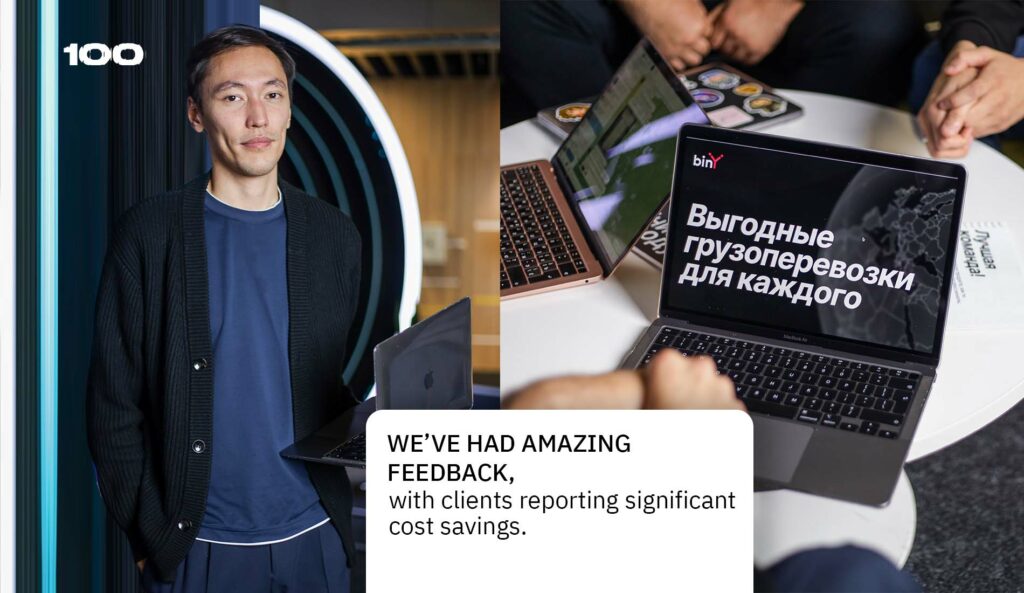
— What’s the achievement you’re most proud of?
— We’ve had amazing feedback, with clients reporting significant cost savings. For one client, we helped save $65 million annually. Our services are much cheaper than traditional transport companies or intermediaries. Plus, our platform provides services no freight forwarder can match, creating great synergy with our clients. It took years to get here, but it was worth it.
— How long has Biny.co been in business?
— This is our second year in the market.
— How does Biny.co make money?
— We have several revenue streams, but we’re still figuring out which one is the most profitable:
- Insurance.
- Client fees for each delivery.
- We don’t charge drivers yet, but we’re planning to introduce a premium subscription that will allow them to see and reserve jobs in advance.
— Do drivers use their own trucks, or does Biny.co provide them?
— Drivers use their own trucks, but they’ve asked for a leasing system. While we’re not financially ready for that yet, we see it as a promising future opportunity.
— What’s next for Biny.co?
— We’re looking to expand into new regions, launch a B2C segment for clients, and develop a mobile app. Clients love our portal but want the convenience of a mobile version. In 2025, we plan to offer consolidated small cargo shipments. Many clients don’t have enough volume for full truckloads, so they’re eager to consolidate and share shipments. We’re also planning to build a digital warehouse that will allow clients to send cargo via our app, with automatic scanning and real-time tracking between cities and countries.
Trust, But Verify
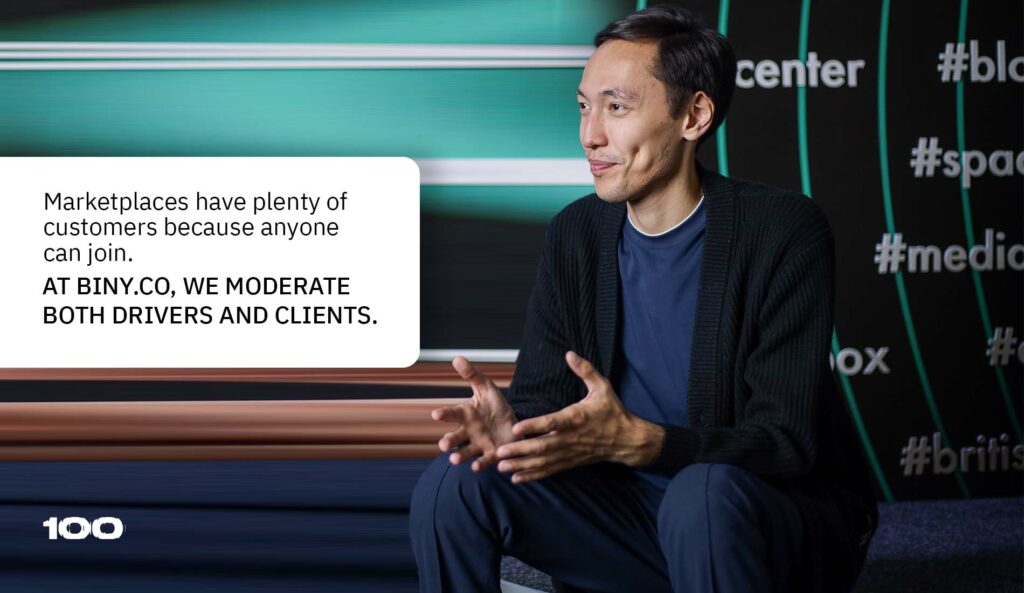
— Do you see marketplaces as competitors?
— Not exactly, but they are major players. Marketplaces have plenty of customers because anyone can join. At Biny.co, we moderate both drivers and clients. In a marketplace, you can’t be sure a verified driver won’t steal your cargo. Cargo theft is a real issue in Kazakhstan, with organized crime involved. They offer lower rates, find a driver heading in another direction, and trick the system. Clients think they’ve arranged a delivery, but the driver takes off in the wrong direction. The driver’s not at fault, but the client is left in the dark. That’s the risk with marketplaces.
— Who are your competitors?
— Our main competitors are CRM systems that help logistics managers handle shipments. What makes us different is that we offer our system for free and handle driver sourcing ourselves. All the client has to do is place an order and click a button. We’ve streamlined the entire process to eliminate unnecessary steps or extra work for the client, allowing them to ship faster and clear their warehouses more efficiently.
Mistakes = Experience = Growth
— How do you keep growing and gaining expertise as your startup evolves?
— We recently got into the Google for Startups accelerator, which came as a bit of a surprise. It was actually our marketing lead who suggested we apply. Before that, we considered ourselves more of a business than a startup since we built the platform with our own funds and had already gone through an investment round. But joining the accelerator has been an incredible experience — we’re learning so much.
Challenges also play a huge role in our growth. Every day, we work on fixing what’s broken. We often set weekly goals, and either we meet them or come up with a new hypothesis and revisit the problem. Our growth really comes from tackling our own challenges head-on.
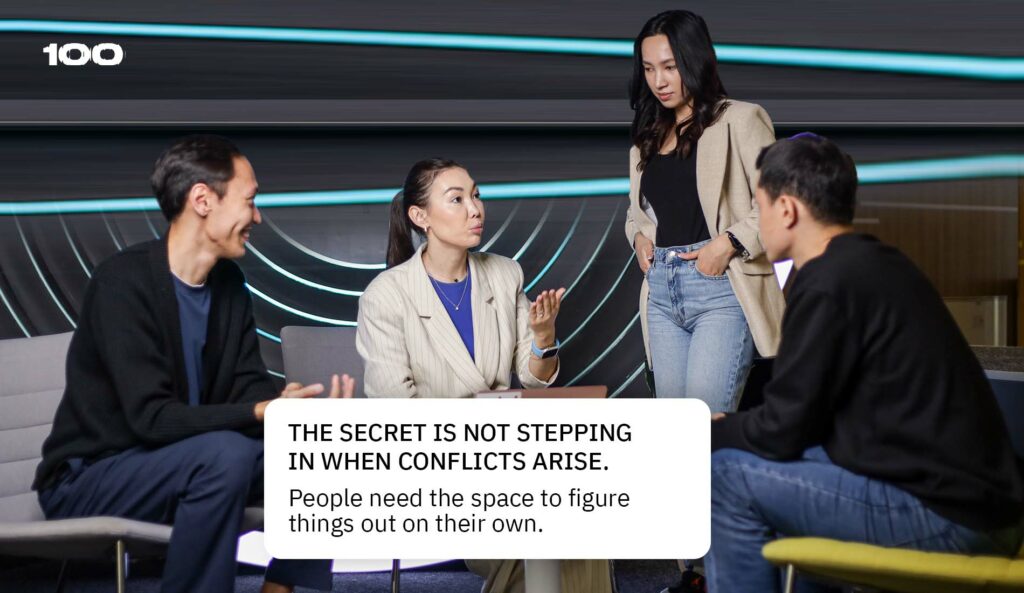
— Your team seems to work really well together. How did you create that dynamic?
— The secret is not stepping in when conflicts arise. People need the space to figure things out on their own. As a leader, I’ve given my team the freedom to make mistakes, spend money, and even fail. I actually think of my team like kids, and that mindset helps me be a better manager. In a lot of ways, employees and children are similar — the more they fail, the more experience they gain. The more problems they solve, the more independent they become. That’s my approach — I try to stay out of the way unless it’s about investments, big contracts, or serious issues.
We’ve also got a strong corporate structure. Our COO, Altynai, has built a healthy work ecosystem where everyone knows their role, how to grow, and what they need to do to see their efforts pay off. We track performance closely, and if someone isn’t meeting expectations after two months, we part ways. If they’re excelling, we move them up the career ladder. A regular manager can get promoted to a leadership position in just a year if they’re delivering consistently strong results.
"Everyone wins while the caravan keeps moving"
— Do you plan to keep leading the company, or would you consider hiring a CEO or selling the business?
— As long as I have the energy, I’ll keep running the company. But if I ever feel like I’m holding it back, I’ll step aside and hire a strong CEO. That said, we haven’t hit that point yet, so I’m still at the wheel. When the time comes, I’ll step down from Biny.co and enjoy some downtime.
— What sport would you compare your startup to?
— I’d say it’s like the 24 Hours of Le Mans, the endurance race. We’re marathon runners, and we operate at an endurance level.
— What’s your mission?
— To make the world a better place. I realized that even if I, as an individual, do something, it won’t necessarily make a big impact. So I set a bigger goal for myself: to transform Kazakhstan’s logistics ecosystem for the better. I want to create one-click access to the world of transportation and logistics so that Kazakhstan becomes a major transit hub for all goods. And as long as the caravan keeps moving, everyone profits. We know transit vehicles and planes will need to stop for fuel, maintenance, food, and rest — all of that brings extra revenue to the economy. That’s my simple plan.




